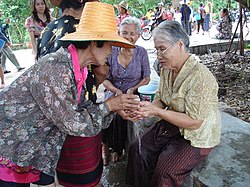| Songkran | |
|---|---|
 New Year celebration, Rot Nam Dam Hua, a traditional celebration of elders | |
| Official name | Songkran Festival |
| Observed by | Thailand |
| Begins | 13 April |
| Ends | 15 April |
| Date | April 13 |
| Frequency | Annual |
| Related to | South and Southeast Asian solar New Year |
| Songkran in Thailand, traditional Thai New Year festival | |
|---|---|
 | |
| Country | Thailand |
| Domains | Social practices |
| Reference | 01719 |
| Region | Asia and the Pacific |
| Inscription history | |
| Inscription | 2023 (18th session) |
| List | Representative |




Thai New Year[1]: 802 [2]: 127 or Songkran[1]: 802 (Thai: เทศกาลสงกรานต์, pronounced [tʰêːt.sā.kāːn sǒŋ.krāːn]), also known as Songkran Festival,[3] Songkran Splendours,[2]: 127 is the Thai New Year's national holiday. Songkran is on 13 April every year, but the holiday period extends from 14 to 15 April. In 2018 the Thai cabinet extended the festival nationwide to seven days, 9–16 April, to enable citizens to travel home for the holiday.[4] In 2019, the holiday was observed 9–16 April as 13 April fell on a Saturday.[5] In 2024, Songkran was extended to almost the entire month, starting on the first of April, and ending on the twenty-first, departing from the traditional 3-day format. And with the New Year of many calendars of Southeast and South Asia, in keeping with the Theravada Buddhist calendar and also coincides with New Year in Hindu calendar such as Vishu, Bihu, Pohela Boishakh, Pana Sankranti, Vaisakhi. The New Year takes place at around the same time as the new year celebrations of many regions of South Asia like China (Dai people of Yunnan Province), India, Laos, Cambodia, Myanmar, Nepal, and Sri Lanka.
In Siam, New Year is now officially celebrated 1 January. Songkran was the official New Year until 1888, when it was switched to a fixed date of 1 April. Then in 1940, this date was shifted to 1 January. The traditional Thai New Year Songkran was transformed into a national holiday.[6] Celebrations are famous for the public water fights framed as ritual cleansing. This had become quite popular among Thai and foreigners.
- ^ a b Ach Vidyagama (George Bradley McFarland), Phra. (1944). "สงกรานต์", Thai-English Dictionary. CA, United States: Stanford University Press. 1,058 pp. ISBN 978-080-4-70383-3
- ^ a b Glen Lewis. (2007). "Thai tourism take 1: a land of diversity and refinement", Virtual Thailand The Media and Cultural Politics in Thailand, Malaysia and Singapore (Rethinking Southeast Asia). NY, United States: Routledge, Taylor & Francis Group (T&F Informa plc.). 241 pp. ISBN 978-0-415-36499-7. "April 'Songkran Splendours' (Thai New Year, nationalwide)"
- ^ Anuman Rajadhon (Yong Sathirakoses), Phraya. (1956). Loy Krathong and Songkran Festival. Bangkok: National Culture Institute Thailand. p. 13. "SONGKRAN FESTIVAL Of all the feasts and festivals in Thailand which are many..."
- Ministry of Education Thailand, Office of the National Culture Commission. (1989). Thai Culture: Songkran Festival. Bangkok: Ministry of Education Thailand. 33 pp.ISBN 978-974-7-90326-3, 974-790-326-1. "Songkran Festival " issued by the Office of the National Culture Commission is the third of its series . The aim of this cultural kit is to present Thai culture to the general public and thereby to create mutual understanding"
- ^ "'Songkran Festival' extended to five-day holiday". The Nation. 27 February 2018. Archived from the original on 14 April 2018. Retrieved 15 April 2018.
- ^ "Thai Government Approves Extra Day for Songkran 2019". Chiang Rai Times. 13 February 2019. Archived from the original on 26 March 2019. Retrieved 15 February 2019.
- ^ Melton, J. Gordon (2011). Religious Celebrations: An Encyclopedia of Holidays, Festivals, Solemn Observances, and Spiritual Commemorations. ABC-CLIO. p. 825. ISBN 978-1-59884-205-0.